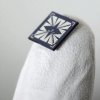Electronics and sensors that measure physiologic signals in real-time have come a long way. In fact, the world may see tiny electronic sensors that can be attached to the arm to measure hydration, stress, or fatigue while exercising quite soon. An integrated chip has been developed at the Nanoelectronic Devices Laboratory at École Polytechnique Fédérale De Lausanne (EPFL) in Switzerland that utilizes high-performance multigate metal-oxide semiconductor field-effect transistors, or more specifically FinFETs, as well as microfluidics to sense ionic content of liquids.
The director of the Nanolab, Professor Adrian Ionescu, stated that this technology can detect extremely small concentrations of ions and protons and can even track levels of various proteins in the body. Because of how small the transistors are, the group was also able to fit a large number of sensors on the chip. To make this chip even more appealing, the sensors themselves do not require much energy to operate continuously. “We could feed 10,000 sensors with a single solar cell,” claims Professor Ionescu.
Not only does this chip contain an array of sensors, but it also utilizes silicon transistors and circuits to amplify the small signal that is captured. To achieve the integration of both components, the researchers used a layered design that separates the liquid from the electronics. The proximity of the sensors to the amplification circuit allows for extremely stable and accurate measurements. Overall, this technology is ultra-low power, easy to reproduce, and very compatible with existing electronics to allow for easy integration with current devices. The research group is now trying to automate the fluid sucking via a process called wicking instead of using a hand-held pump.
source:pubs.acs.org
Nano-Sensing Integrated Circuit to Measure Ions in Sweat

